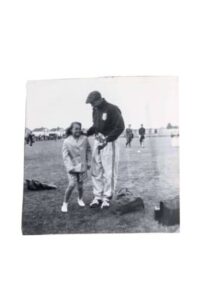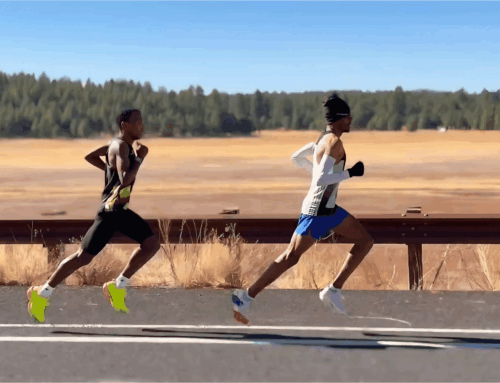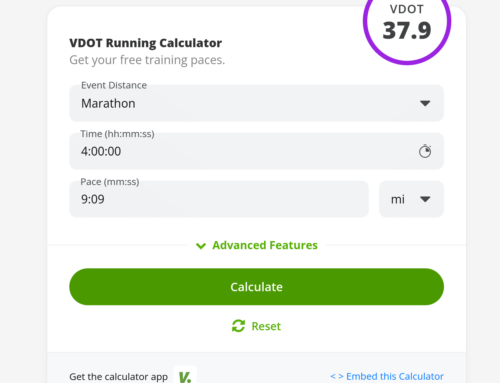
Having lived in 16 states and several foreign countries along with my years of competing in three World Championships, two Olympics, and visiting 30 foreign countries, I’ve come up with five ingredients of success. A lot of my opinions are based upon over 50-years of coaching Olympians, collegians and individuals of all ages and various walks of life, including a man I coached for 5-years while he served time in a state prison.
Below are my five Ingredients of Success using athletic performances as examples:
#1 Inherent Ability — What you are born with.
This ingredient is the easiest to justify, especially in athletics, because the differences among individuals can be so obvious. Place a female Olympic gymnast next to a 365-pound football lineman and imagine who is better suited for success in a shot put competition, or a wrestling competition. It would seem quite obvious that the larger individual would dominate in certain sports, but that small gymnast would certainly have an advantage riding a horse in the Kentucky Derby.
We, in fact, admit that there are bodies better designed for some sports in Olympic competition, otherwise there would not be any need for weight categories in boxing, wrestling, weightlifting, etc. It is also possible that inherent differences may not be obvious but they still exist. In distance running two individuals may be of equal body size and even train and eat the same diet, but one has an advantage because of a stronger cardiovascular system or better mechanics at important joints; things that are not visible but still strongly influence performance.
#2 Motivation – Your intrinsic desire to perform specific tasks.
As pointed out in ingredient #1, body structure has a major influence on success in many sporting events. However, even though a specific individual may have the ideal body design and physiological characteristics to be a champion in a particular sport, this individual may not have any desire to pursue that sport. A perfectly designed basketball player may want to be a concert pianist and direct all their efforts for success on practicing the piano.
Based on just the first two ingredients there are 4 types of individuals:
- AM — Those with outstanding inherent Ability and strong intrinsic Motivation to pursue what that ability is suited for; these individuals are champions.
- ANM –Those with great Ability for a particular sport, but with No Motivation to pursue that sport; these individuals are “coach-frustraters.”
- NAM –Those with No Ability to perform in a sport for which they are highly Motivated; these individuals are “self-frustraters.
- NANM— Those with No Ability Nor Motivation to pursue a particular sport; there is no need to worry about these individuals because they will show no interest.
#3 Opportunity – Your ability to participate in a specific sport of interest.
As in ingredient #1, some Opportunity in sports is very clear cut as to whether it is available. Take swimming for example; having great ability and motivation will not get the job done if there is no place to swim/train. Same is relatively true of winter sports if you live in a hot environment year round (no snow to ski, for example). A little less subtle is not having an opportunity to practice against an opponent. Sports like tennis and fencing are examples of sports in which practicing against someone else is important in achieving success. Having enough money to travel to competitions is another example of opportunity or lack thereof.
#4 Direction – Having a coach, teacher or written plan.
I consider Direction as the only ingredient that can be negative. In the first three ingredients each individual either has no ability, no motivation, no opportunity, or has various amounts of these important ingredients. However, direction can be good, relatively non-existent, or it can be bad or worse than no direction.
I have coached many marathon runners over the years and several have advanced to being comfortable running 150 miles each week for an entire season of training. If a beginner asked me to provide training for a marathon that was to be run in a few months and I told them to run 150 miles each week, one of the following would likely be the result of that demand: no attempt because it’s too demanding, they attempted but weren’t able to accomplish it, they accomplished some or all of it and suffered a bad injury. Prescribing 150-miles-per-week is negative advice and most likely it would be worse than no advice at all.
#5 Focus On The Task At Hand – Your ability to focus on what’s in front of you.
Take advantage of the first four ingredients and always concentrate on what you are doing/trying to achieve. In any running performance, keep in mind that you have no control over others who may be competing against you and they have control over you. You have control over yourself and what you are doing, so focus on proper technique, and always adapt to conditions under which you are competing.
Become a faster runner using Dr. Jack Daniels’ VDOT training methodology.




